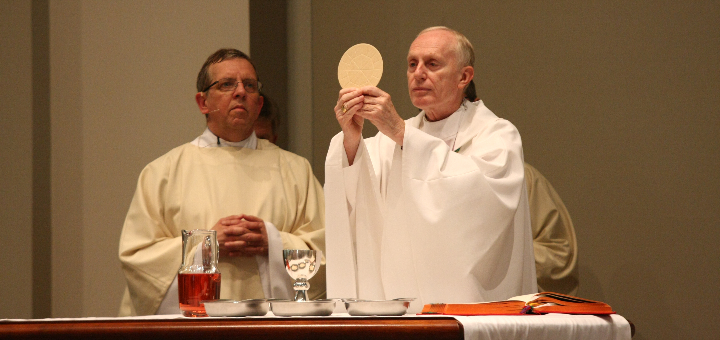
 Image credit: By Josh Applegate (2019). Unsplash.com, CC0/PD[/caption]
At the beginning of August, there was a very heavily shared PEW research study that claimed approximately two-thirds of Catholics only believe the Eucharist is a symbol. If true, this is a major discrepancy in belief because that’s not what the Church teaches.
This study has several problems in its presentation, but I’m just going to talk a little bit about the importance of language. Where I take issue is that we cannot say that the Eucharist isn’t a symbol. In fact that is one of the ways to describe the Eucharist. It is only problematic if we believe it’s only a symbol. Given the wording of the question, an educated person in Catholic teaching wouldn’t be able to easily choose because the first two answers both apply. Secondary to this, they also didn’t use the terms Catholics use to describe the presence of Jesus in the Eucharist. The term they used is "actual":
Which of the following best describes Catholic teaching about the bread and wine used for Communion? The bread and wine …
Image credit: By Josh Applegate (2019). Unsplash.com, CC0/PD[/caption]
At the beginning of August, there was a very heavily shared PEW research study that claimed approximately two-thirds of Catholics only believe the Eucharist is a symbol. If true, this is a major discrepancy in belief because that’s not what the Church teaches.
This study has several problems in its presentation, but I’m just going to talk a little bit about the importance of language. Where I take issue is that we cannot say that the Eucharist isn’t a symbol. In fact that is one of the ways to describe the Eucharist. It is only problematic if we believe it’s only a symbol. Given the wording of the question, an educated person in Catholic teaching wouldn’t be able to easily choose because the first two answers both apply. Secondary to this, they also didn’t use the terms Catholics use to describe the presence of Jesus in the Eucharist. The term they used is "actual":
Which of the following best describes Catholic teaching about the bread and wine used for Communion? The bread and wine …
- Actually become the body and blood of Jesus Christ
- Are symbols of the body and blood of Jesus Christ
- Not sure
Actually Tells Us Very Little
Nowhere in our church documents or in our language do we describe it as Jesus being "actually" present. Dr. Brett Salkeld and Deacon Eric Gurash take this to bat in their podcast Thinking Faith about this. I agree with them that the wording can make a difference: do you believe Jesus’ is actually present? Or would the question make more sense if it was phrases as really present, or truly present, or substantially present. If our church is one thing, it is exceptionally careful about the words it chooses to use when it comes to talking about the Eucharist (and other things). As Dr. Brett says in that podcast, we don’t say that Jesus is literally present and we don’t say he’s actually present, and the reason is that there are implications with those terms that, when thought through, are not what we can say about the Eucharist. He isn’t the only one who agrees that the wording isn’t ideal. Mark M. Gray who edits for the Center for Applied Research in the Apostolate (CARA) blog says,“My hunch is that if you replace 'actually' with 'really' in the questions (or better yet use 'Jesus Christ is really present in the bread and wine of the Eucharist vs. Bread and wine are symbols of Jesus, but Jesus is not really present') you’ll see a different result. It’s subtle.”CARA’s a non-profit research center that conducts social scientific studies about the Catholic Church and has also polled Catholics amongst the population and, with more people who answered, the survey came up with a significantly different response (several years ago) that was more along the lines of two-thirds of Catholics do believe that the Eucharist is really Jesus’ body and blood (paraphrasing). This is curious and the discrepancy is hard to make an account for. CARA will be doing a further survey this year, an article at Ascension Press says.
 Image credit: By Josh Applegate (2019), Unsplash.com, CC0/PD[/caption]
Image credit: By Josh Applegate (2019), Unsplash.com, CC0/PD[/caption]
What’s Our Response?
While the headline is shocking, it’s hard to determine if the PEW survey was truly done well and whether it really represents what the majority of Catholics believe. Yes, there are a lot of people in our parishes who have a perhaps lukewarm (at best) understanding of the Eucharist. But I don’t believe that we need to lose hope, and if the survey had been worded well we might have seen a more positive result. If anything though, this is good information for us to open our eyes to the reality of our parishes. It gives us a better chance to meet people where they’re at in their journey and it shows us how much opportunity we have to evangelize even within our own parishes. The opportunity to share Jesus more and give glory to God is before us. We were not given hearts of cowardice or despair, we were given hearts aflame for just a purpose as this. Let’s embrace the challenge before us and turn our own parishes around. Have you had a chance to read the Church’s teaching on the Eucharist? You can read the Catechism for free online if you’d like to understand more.Copyright 2019 Jane Korvemaker
About the Author

Jane Korvemaker
Jane Korvemaker loves food, family, wine, and God (perhaps not in that order). She holds a Certificate in Culinary Arts, which pairs perfectly with her Bachelor in Theology. A former Coordinator of Youth Ministry, she writes from the beautiful and cold province of Saskatchewan, Canada. She works from home and takes care of her three very hard-working children. Jane regularly blogs at AJK2.ca.


.png?width=1806&height=731&name=CatholicMom_hcfm_logo1_pos_871c_2728c%20(002).png)
Comments